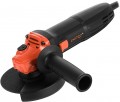In box
—
Additional handle. Separate handle for a second hand. Theoretically, such equipment could make the instrument more comfortable to hold with two hands. However, in fact, the absence of an additional handle is often not critical: many tools without it are either intended to be held in one hand (like some straight grinders, see "Type"), or have other adaptations for a second hand (for example, a ledge on the body). So to answer the question of whether you need an additional handle, you need to take into account the type and size of the grinder, as well as the features of the planned work. Also note that by default such a handle is designed for right-handers, and the possibility of its use with left-handed holding should be specified separately.
—
Charger(charger). A device for charging the battery in a grinder with the appropriate type of power supply (see "Power supply"). Also in this paragraph, a specific model of the charger is usually specified. In itself, the presence of a "charger" in the kit eliminates the need to look for and buy it separately; at the same time, such a charger is optimally suited to at least the “native” battery, and often also to other compatible batteries. And data on the model will be useful, first of all, in case the complete charger is lost or fails and you have to buy the same or similar one instead. In addition, knowing the charger model, you can find detailed data abo
...ut it and evaluate its characteristics and features (compatibility with various batteries, additional functions, etc.). At the same time , the “without charger” package is also very popular — see below for more on it.
— No charger. This feature is indicated exclusively for battery models (cars with other types of power supply — see "Power Source" — by definition do not have a charger, there is no need to specify this point for them). The meaning of this configuration is that modern grinders most often use standard batteries, which are also suitable for other power tools of the same brand and are designed, respectively, for standard “chargers”. Thus, if the "household" already has a battery tool, then the charger for it may be suitable for the grinder, you will not need to overpay for the second copy of the charger. And even if the charger is not available, usually, it can be purchased separately without much difficulty (moreover, some tools also allow you to choose the most suitable model of such a device from several options).
— Case / bag included. The presence of a case or bag for storing and transporting the tool. The case is a suitcase and is made of durable material, usually there is a place not only for the machine itself, but also for working attachments and other additional accessories. The bag is soft, which allows it to be compactly folded when there is no need for it. Check the availability of a case or bag immediately before buying.
— Dust collector. Container for collecting dust and other contaminants that occur during operation. See "Advanced — Connecting the dust box" for details.
— Barbell. A long rod significantly expands the "radius" of the tool: with such equipment, you can reach a great height, process a large area without rearranging the platform or other stand, etc. Such features are relevant primarily when processing walls, so the vast majority of grinders with rods in the kit are wall grinders(see "Type").Power cord length
The length of the network cable can tell you how far from the outlet you can operate the device. Therefore, for domestic use, it is more relevant to choose models with a short cord, for construction work or use in production, in the garage a
longer cable is better.
Weight
The total weight of the grinder; for battery models (see "Power Source"), usually, it is indicated without taking into account the battery.
This indicator has two meanings. On the one hand,
light weight has a positive effect on manoeuvrability and reduces fatigue during work — especially when processing vertical surfaces and ceilings, as well as in other situations where the tool has to be held on weight. On the other hand, for grinders with a vibrational principle of operation (see "Type"), used for processing horizontal surfaces, a significant weight is considered optimal: it allows the tool to fit closer to the material being processed, and also contributes to stability and retention. So when choosing such a model by weight, it is worth considering the features of its intended application.

